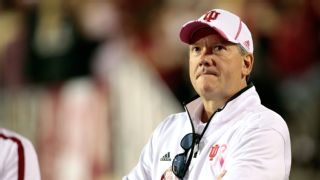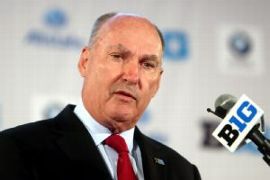|
ROSEMONT, Ill. -- There are two huge, readily acknowledged myths about how college athletes spend their time. One is that the NCAA's 20-hour-per-week rule comes even remotely close to accuracy. The other is that players have any real choice whether to participate in "voluntary" offseason training programs. The Big Ten would like to put both those myths to rest through such actions as scrapping the 20-hour rule and putting padlocks on their workout facilities during the summer. Reducing time demands on players became a big topic at the Big Ten spring meetings this week, and -- unlike the pie-in-the-sky freshman-ineligibility idea -- conference leaders have some concrete ideas on how to accomplish that. "Student-athletes need more time off," Wisconsin athletic director Barry Alvarez said "They need a little time to clear their heads, to do an internship, to study abroad."  Football has become a year-round sport, with players getting small breaks between the end of the season and the start of winter conditioning, perhaps a week or two from the end of the spring semester until summer workouts and maybe a week of spring break. Big Ten officials would like to see more mandated time off, especially in the summer. Alvarez even suggested following the model of the NFL, which has strictly-enforced rules about when teams can hold organized workouts during the offseason. Football has become a year-round sport, with players getting small breaks between the end of the season and the start of winter conditioning, perhaps a week or two from the end of the spring semester until summer workouts and maybe a week of spring break. Big Ten officials would like to see more mandated time off, especially in the summer. Alvarez even suggested following the model of the NFL, which has strictly-enforced rules about when teams can hold organized workouts during the offseason.
Indiana athletic director Fred Glass said there should be times when schools "literally and figuratively lock the gym door." Players who still wanted to work on their game during those periods would be free to do so, but it wouldn't be a requirement, spoken or unspoken, from their coaches. "They’re going to download film on their iPad and work in their dorm room on it, and in some ways that’s great if that’s what they want to do," Glass said. "But I think the peer pressure and this falsehood about it being optional, when everybody feels the peer pressure or the coach pressure indirectly, I don’t think that’s what we should be doing. I think we should be creating room that if people want to be doing other things, to have more of a student experience, we facilitate it." The Big Ten floated the "year of readiness" plan mostly as a ploy to get people focused on discussing more academic and student-welfare issues, or what Glass called "less controversial and more doable" reforms. Finding new time-demand rules is a more reasonable and achievable path for the league. Consider the ludicrousness of the 20-hour rule and just one example of how flawed it is. Say a football team is on the road on the West Coast for a night game. Players spend the day going through walk-throughs and huddling with coaches before kickoff, then take a long flight back home after midnight. That still only counts as three hours on the official NCAA scorecard. Big Ten commissioner Jim Delany noted that studies have shown that Division III athletes spend nearly 40 hours per week on their sport, while Division II players work more than 40 hours. Division I athletes, he said, could approach 50 hours per week. Alvarez wants to kill the 20-hour rule, "because how do you keep track of it? Come on. Just don’t have rules that you can't enforce." Delany favors that idea but said it would require a "deep dive" into the issue that included coach and player input from each sport about their particular time requirements. And then there would need to be a way to enforce any new limit. "We can't have a cop on every beat," Delany said. "So it’s got to be something that on some level can be self-executed."  These ideas bring their own complications. Coaches are under immense pressure to win and would likely not enjoy giving up time their players can spend working to improve. But Delany said coaches "would have to be in on it, and I think you'd have to ask them, 'Where can you help us and where can we help you?'" These ideas bring their own complications. Coaches are under immense pressure to win and would likely not enjoy giving up time their players can spend working to improve. But Delany said coaches "would have to be in on it, and I think you'd have to ask them, 'Where can you help us and where can we help you?'"
Players who have dedicated much of their lives to training for a sport and have pro aspirations aren't suddenly just going to relax in the summertime, either. Joey Bosa and Christian Hackenberg probably aren't heading off to Europe in June. That could lead motivated athletes to work more off campus and be less supervised. Coaches are already concerned about the growing influence of third parties and private tutors, such as the so-called quarterback gurus. But Delany said the potential downsides are worth it because "it's hard to think about a global educational experience" without at least giving players the opportunity for offseason internships and studying abroad. "We’re not saying you can't train [on your own], and it may well be that the facility is off the grounds," Delany said. "So if they go to a Gold’s Gym, they go to a Gold’s Gym." Delany said the Big Ten will continue to study the time-demand issues over the next several months before coming up with some possible proposals. Unlike the freshman ineligibility idea, this is one area where the league could potentially take the lead for some actual changes.
|
